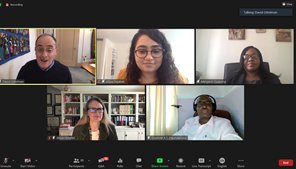On Tuesday, 16 February, the Health Campaign Effectiveness Coalition launched its Test & Learn Series, a new event series dedicated to advancing learning, collaboration and communication in critical health campaign issues across different health campaign domains, country leaders, global actors, donors and implementing groups.
Watch the recording of the presentation in English | French | Spanish and view the slides and the infographic presented during the event.
The inaugural event, titled “Opportunities for Campaign Integration and Co-delivery,” featured a research team from the University of Ottawa and Bruyere Research Institute (Canada), the University of Medical Sciences (Nigeria), and the University of Health and Allied Sciences (Ghana).
The team shared findings from interviews with 28 health campaign managers across immunization, polio, malaria, Vitamin A, and NTD programs from Cote d’Ivoire, Ethiopia, Ghana, Guyana, Indonesia, and Nigeria.
 “We found that factors that enable or hinder integration fall into six categories: human resources, contextual issues, communication & coordination, commodities, data management, and logistics,” said Margaret Gyapong, Director of the Centre for Health Policy and Implementation Research at the University of Health and Allied Sciences, Ghana.
“We found that factors that enable or hinder integration fall into six categories: human resources, contextual issues, communication & coordination, commodities, data management, and logistics,” said Margaret Gyapong, Director of the Centre for Health Policy and Implementation Research at the University of Health and Allied Sciences, Ghana.
Moderated by David Gittelman of the Alliance for Malaria Prevention, the conversation with the research team was followed by a “Learning Salon,” where participants submitted questions to the panel and discussed potential recommendations and their implications with the research team.
 “One surprise that came from the research was that the majority of informants considered leadership to be a key quality,” said Dr. Olumide Ogundahunsi, Professor and Director of Research, Innovation and Development at the University of Medical Sciences, Ondo City, Nigeria. “Leadership accountability, good interpersonal relationships, the ability to bring people together, and not taking credit for the work of other people came up quite often. We didn’t expect that.”
“One surprise that came from the research was that the majority of informants considered leadership to be a key quality,” said Dr. Olumide Ogundahunsi, Professor and Director of Research, Innovation and Development at the University of Medical Sciences, Ondo City, Nigeria. “Leadership accountability, good interpersonal relationships, the ability to bring people together, and not taking credit for the work of other people came up quite often. We didn’t expect that.”
One of the biggest challenges the team discovered was the issue of aligning the priorities and timelines of campaigns with multiple funding parties.
“Multiple implementing partners often means multiple fiscal calendars,” said Alison Krentel, Assistant Professor at the University of Ottawa and scientist at the Bruyère Research Institute. “This becomes a factor in resource optimization: donors have diverging interests, and if they are focused on a specific area or outcome, it can lead to a lack of funding for all other activities.”
The team also found that incentives could create another barrier to integration. Since integrated or co-delivered campaigns can sometimes mean fewer financial incentives to workers on the ground, those workers may not want to support integration.
“Are workers at community level missing out on incentives and per diems by integrating?” said Krentel, who credits an informant in the study with summarizing the problem best: “An incentive is like junk food. You get it now and you need it in the afternoon, you need it tomorrow. But it is not healthy. It doesn’t help the government, it doesn’t help the health worker, it doesn’t help anybody, even the donor and the implementing partner.”

However, the team also pointed out the benefits that integration can offer workers, such as the reduction of their workload.
“On the ground, there’s a lot of integration happening anyways. It’s just not necessarily being formally documented,” said Afzaa Rajabali, Research Assistant at the Bruyère Research Institute. “When we asked how community distributors felt about integration, they said they were happy because it saves so much time and is so much more efficient.”
Overall, the team was very positive about the potential for integration, calling out its potential to increase efficiency for future campaigns. The final report from the team will be available in a few weeks.
The Health Campaign Effectiveness Coalition would like to thank the presenters for their time, and plans to continue the conversation in future events. Watch the recording of the presentation in English | French | Spanish and view the slides and the infographic presented during the event.
The Test & Learn series will continue to highlight different innovative campaign approaches and delivery models in the coming months. Future events in the series will be announced on the Health Campaign Effectiveness Coalition website, in its newsletter, and on its social channels.
